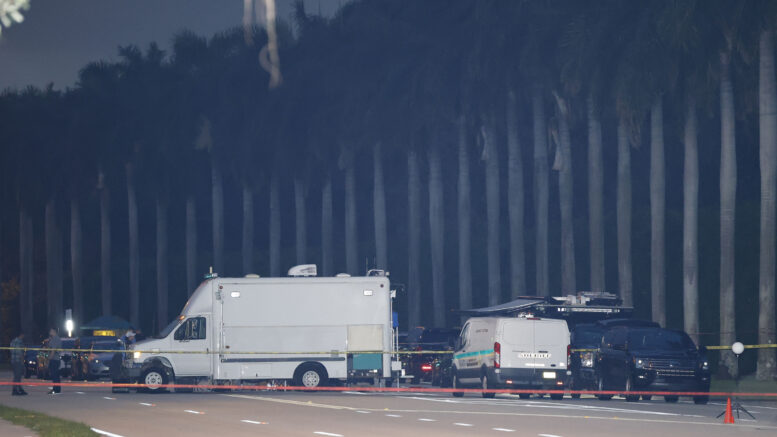WASHINGTON (AP) — Sunday was to be a day of relative rest for Donald Trump, a rare breather this deep into a presidential campaign. Aside from sounding off on social media, golf was on the agenda.
Then the Secret Service spotted the muzzle of a rifle sticking out of a fence in bushes at Trump’s West Palm Beach golf club, and everything changed.
For the second time in just over two months, someone apparently tried to shoot Trump and came dangerously close to the former president in that effort — within 500 yards Sunday, law enforcement officials said. This time, the gunfire came from the Secret Service, before the suspect could get any shots off at his target.
The episode raised sharp questions about how to keep the former president safe — not only while he is campaigning across the country, but while he spends time at his own clubs and properties.
Trump has had stepped-up security since the assassination attempt on him in July, when he was wounded in the ear during an attack that laid bare a series of Secret Service failures. When he has been at Trump Tower in New York, parked dump trucks have formed a wall outside the building. And at outdoor rallies, he now speaks from behind bulletproof glass.
But unlike typical VIPs, who live in private residences with tall fences, Trump, while in Florida, resides at a club open to dues-paying members, and often spends his down time at his golf courses. And this a toxic era in the nation’s politics.
“The threat level is high,” Rafael Barros, special agent in charge of the Secret Service’s Miami field office, told reporters Sunday. “We live in danger times.”
Sunday in the political world opened with Trump assailing a pop star on social media who had endorsed Kamala Harris — “I HATE TAYLOR SWIFT” — complaining about the post office and hitting the links. Running mate JD Vance riffed on TV about that thoroughly debunked conspiracy theory concerning immigrants and pets, refusing to disown it. Democrats were apoplectic.
All that was standard fare for the most tumultuous presidential campaign in anyone’s memory. But shortly before 2 p.m., the subject abruptly changed and this election was thrust ever deeper into unprecedented territory.
Trump and golf partner Steve Witkoff were on the fifth hole of the course and about to putt when they heard the “pop, pop, pop, pop,” said Fox News host Sean Hannity, a close friend of the former president who spoke with him several times afterward as well as with Witkoff.
Moments later, Hannity said, a “fast cart” with steel reinforcement and other protection whisked Trump away.
After the Secret Service noticed the rifle and then the suspect, an agent fired on him but apparently missed.
Secret Service agents immediately used their bodies to shield Trump and moved him to the golf course’s clubhouse, where he remained until he went back to Mar-a-Lago about 15 minutes away, according to a person with knowledge of the situation who was not authorized to discuss it publicly and described it on condition of anonymity.
About an hour later, Secret Service spokesman Anthony Guglielmi said the agency and Palm Beach County Sheriff’s Office were investigating an unspecified “protective incident involving former President Donald Trump,” adding he was safe.
The meaning was highly unclear. It could have been an unrelated shooting or disturbance near Trump, for all the country knew at first. “There were about 20 or more cop cars flying from nearby streets,” said Max Egusquiza, of Palm Beach, describing the emergency response he witnessed.
The Trump campaign issued a statement saying “President Trump is safe following gunshots in his vicinity.” Again, no word whether he was the intended target.
But it soon became known that the Secret Service had fired shots. And about an hour after that happened, Donald J. Trump Jr. posted on X that an AK-style rifle was discovered in the bushes, “per local law enforcement.”
All of that was finally followed by an FBI statement saying it is investigating “what appears to be an attempted assassination of former President Trump.”
The suspect quickly vanished but law enforcement had managed to identify his vehicle.
Martin County Sheriff William D. Snyder said his deputies “immediately flooded” northbound I-95, deploying to every exit between the Palm Beach County line to the south and St. Lucie County line to the north.
The suspect was apprehended within minutes of the FBI, Secret Service and Palm Beach County Sheriff’s Office putting out a “very urgent BOLO” — or be-on-the-lookout alert — detailing the specific vehicle sought, license plate number and description of the driver.
“One of my road patrol units saw the vehicle, matched the tag and we set up on the vehicle,” Snyder said, “We pinched in on the car, got it safely stopped and got the driver in custody.”
Snyder added: “He never asked, ‘What is this about?’ Obviously, law enforcement with long rifles, blue lights — a lot going on. He never questioned it.”
With that, police arrested Ryan Wesley Routh, 58, of Kaaawa, Hawaii, three law enforcement officials told The Associated Press. The officials identified the suspect to AP but spoke on condition of anonymity because they were not authorized to discuss the investigation.
The suspect had left behind an AK-style rifle with a scope, two backpacks hanging on a fence with ceramic tile inside and a GoPro camera, Palm Beach County Sheriff Ric Bradshaw said.
The sheriff said the suspect was 400 to 500 yards away from Trump hidden in shrubbery, while the former president played golf on a nearby hole.
“It was certainly an interesting day! ” Trump posted on Truth Social on Sunday night. He effusively thanked law enforcement for keeping him “SAFE.”
___
Associated Press writers Jill Colvin, Colleen Long, Eric Tucker, Alanna Durkin Richer, Mike Balsamo and Michael R. Sisak contributed to this report.




































